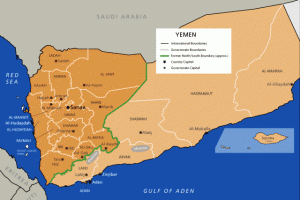 Talks between Yemenis continue to be stalled with the Southern part of the country determined to become a breakaway independent state. The government is accusing other regional countries of supporting the South’s desire after limited progress was achieved in maintaining the integrity of the state. The dialogue which was to end last month is likely to be prolonged by “one, two or three months, but not more,” according to foreign minister Abubaker Al Qirbi.
Talks between Yemenis continue to be stalled with the Southern part of the country determined to become a breakaway independent state. The government is accusing other regional countries of supporting the South’s desire after limited progress was achieved in maintaining the integrity of the state. The dialogue which was to end last month is likely to be prolonged by “one, two or three months, but not more,” according to foreign minister Abubaker Al Qirbi.
The reconciliation talks have been sabotaged by the boycott exercised by some of the groups in the South. They want an immediate end to talks which started in March. The talks are part of a roadmap to draft a new constitution and the preparations of the upcoming February elections.
The demand for secession is gaining popularity in the South but the foreign minister blamed Iran, Hezbollah and the “very negative attitude” of former South Yemen’s exiled president, Ali Salem Al Baid. UN Security Council said the Former President Al baid is slowing down the country’s political transition.
South Yemen was once independent but the North fought it to reunite the country. Yemen’s main threat is Al-Qaeda “which is still present and presents a danger, even though security services have succeeded in weakening it,” the minister underlined.
However, they are interested in safeguarding the country and ensure that it remains united; to avoid another division. Although Minister Al Qirbi is optimistic that the national dialogue will not surpass three months after they failed to reach an agreement before the 18th of last month.
In a bid to criticize the former South Yemen’s President Al Baid’s position, he pointed fingers at the Shia linked institutions and accused Hezbollah of providing protection for the former president who is living in Beirut.
Yemen struggles to maintain South integrity
